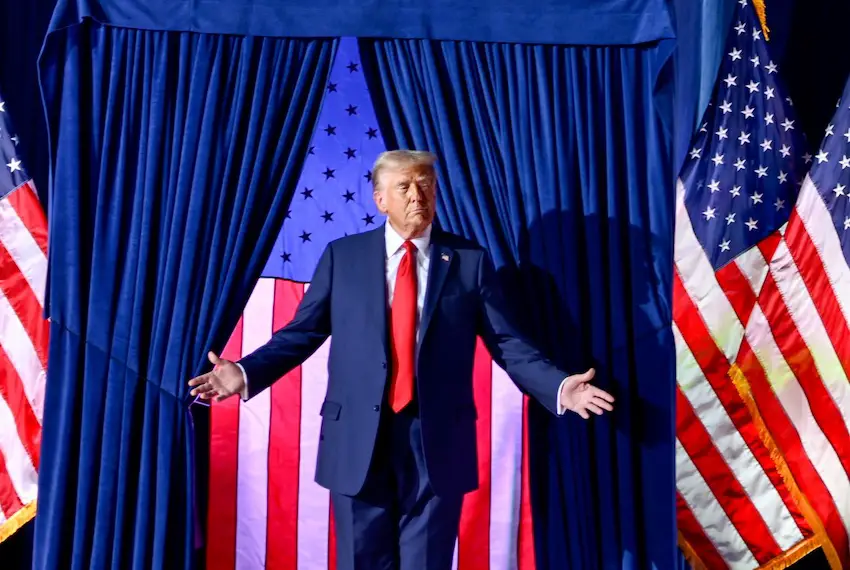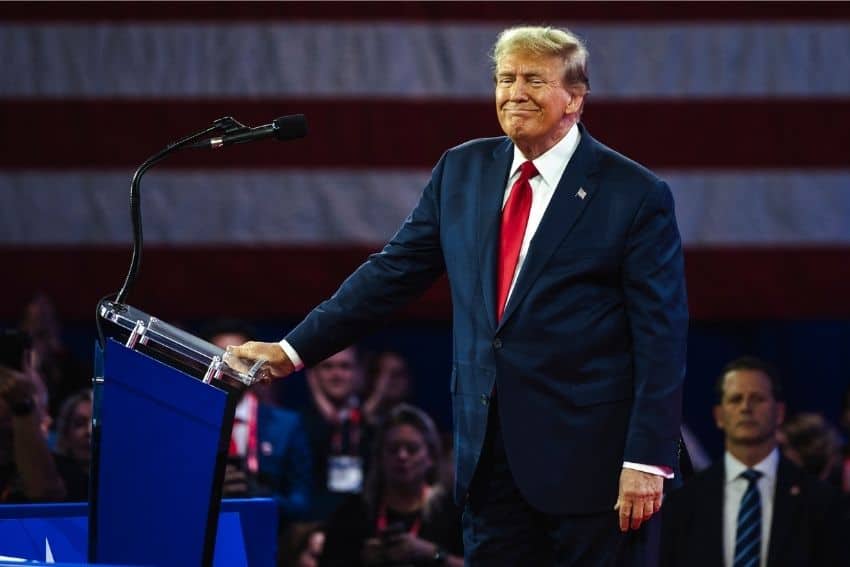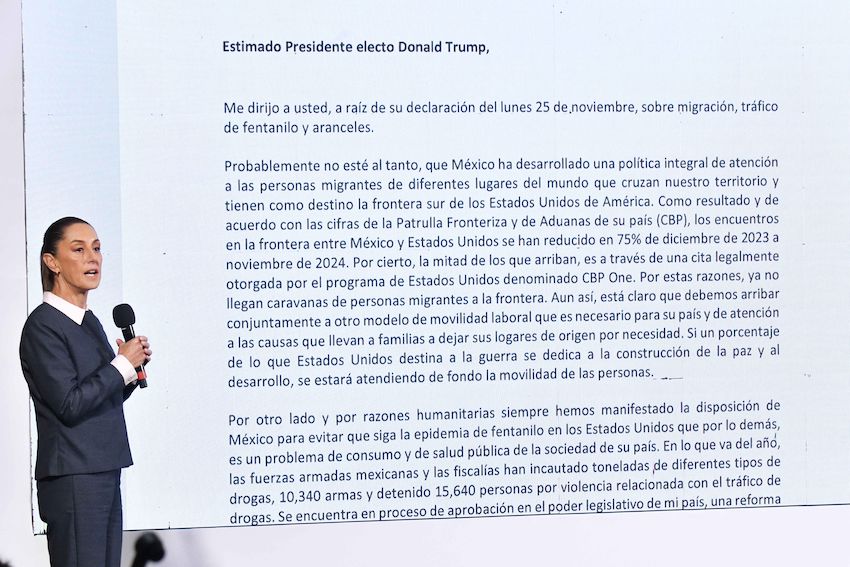Sheinbaum ready to match Trump’s 25% tariffs

Donald Trump on Monday pledged to impose a 25% tariff on all Mexican and Canadian exports to the United States on the first day of his second term as U.S. president, a move that President Claudia Sheinbaum said would be met with a reciprocal tariff on U.S. exports to Mexico.
Trump outlined his plan on his social media site Truth Social exactly three weeks after he made a similar promise on the eve of the United States presidential election.
“As everyone is aware, thousands of people are pouring through Mexico and Canada, bringing Crime and Drugs at levels never seen before,” he wrote on Truth Social on Monday evening.
“Right now a Caravan coming from Mexico, composed of thousands of people, seems to be unstoppable in its quest to come through our currently Open Border. On January 20th, as one of my many first Executive Orders, I will sign all necessary documents to charge Mexico and Canada a 25% Tariff on ALL products coming into the United States, and its ridiculous Open Borders,” Trump wrote.
The president-elect said that the tariff would remain in effect “until such time as Drugs, in particular Fentanyl, and all Illegal Aliens stop this Invasion of our Country!”
“Both Mexico and Canada have the absolute right and power to easily solve this long simmering problem. We hereby demand that they use this power, and until such time that they do, it is time for them to pay a very big price!” Trump said.
In a separate Truth Social post, the former president said that his administration would impose an additional 10% tariff “above any additional Tariffs” on Chinese imports until the Chinese government stops the flow of fentanyl and other drugs to the United States “mostly through Mexico.”
Imposing tariffs on Mexican and Canadian exports to the United States would violate the terms of the USMCA, but Trump — at least in his rhetoric — appears to have no qualms about breaching the free trade pact he signed during his first term as U.S. president.

The president-elect’s pledge to impose a 25% tariff on the United States’ biggest trade partners on his first day in office is a bold but unsurprising move. Whether he actually keeps his word is far from certain, considering his past conduct.
While president in 2019, Trump threatened to impose a 5% tariff on all goods from Mexico if the Mexican government didn’t do more to stem migration to the United States. The two countries subsequently reached a deal that averted the blanket tariffs and resulted in Mexico deploying federal security force members to both its southern and northern border.
At a 2022 rally in Ohio for then U.S. Senate hopeful and now vice president-elect J.D. Vance, Trump boasted that he succeeded in getting Mexico to act in the United States’ interests.
His latest tariff pledge, or threat, could be a similar ploy to pressure Mexico to crack down even further on the flow of migrants and drugs to the U.S. If the Mexican government were to deploy additional human and monetary resources to stem those flows, Trump could claim again that he succeeded in getting Mexico to do what he wanted.
Sheinbaum: ‘To one tariff, another will come in response’
On Tuesday morning, Sheinbaum gave no indication that Mexico would “fold,” as Trump claimed was the case in 2019.
At her regular daily press conference, the president told reporters she would send a letter to the president-elect “today.”


(Mario Jasso/Cuartoscuro)
Sheinbaum read out the entire letter, which in its penultimate paragraph said that a U.S. tariff on Mexican exports would be met with another tariff “in response.”
In her letter, the president also:
- Told Trump that Mexico has developed a “comprehensive policy” to attend to migrants who “cross our territory” en route to the United States. She told the president-elect that he “probably” isn’t aware of the efforts Mexico has made to stem migration to the U.S.
- Highlighted that “encounters” between United States authorities and migrants on the Mexico-U.S. border declined 75% between December 2023 and November 2024.
- Told Trump that Mexico and the United States need to jointly develop “another model of labor mobility” that responds to the U.S. need for workers and provides “attention to the causes that lead families to leave their places of origin.”
- Told Trump that if the United States allocated “a percentage” of what it spends on “war” to “the construction of peace and to development,” it would be able to substantially reduce migration.
- Pointed out that Mexican authorities have seized tonnes of drugs so far this year, confiscated more than 10,000 weapons and arrested over 15,000 people “for violence related to drug trafficking.”
- Highlighted that 70% of “illegal weapons” seized in Mexico come from the United States.
“We don’t produce the weapons, we don’t consume the synthetic drugs,” Sheinbaum wrote in her letter to Trump.
“The deaths due to crime that responds to the demand for drugs in your country, unfortunately, we are the ones who … [suffer] them,” she told the president-elect.
Sheinbaum told Trump that neither the migratory phenomenon nor drug use in the United States will be effectively dealt with through threats and tariffs.
“Cooperation and reciprocal understanding of these great challenges is needed. To one tariff another will come in response and that’s the way it will be until we place common companies at risk. Yes, common ones. For example, among the main exporters from Mexico to the United States are General Motors, Stellantis and Ford Motor Company, which arrived in Mexico 80 years ago,” she wrote.
!["The deaths due to crime that responds to the demand for drugs in your country, unfortunately, we are the ones who ... [suffer] them," Sheinbaum told the president-elect.](https://mexiconewsdaily.com/wp-content/uploads/2024/11/1007644_Conferencia-Matutina-Sheinbaum-8_impreso.jpg)
!["The deaths due to crime that responds to the demand for drugs in your country, unfortunately, we are the ones who ... [suffer] them," Sheinbaum told the president-elect.](https://mexiconewsdaily.com/wp-content/uploads/2024/11/1007644_Conferencia-Matutina-Sheinbaum-8_impreso.jpg)
“Why impose a tax that places them at risk? It’s not acceptable and would cause inflation and job losses in the United States and Mexico,” Sheinbaum continued.
“I’m convinced that the economic strength of North America lies in maintaining our trade partnership. In that way, we can continue being more competitive against other economic blocs. I believe that dialogue is the best path for understanding, peace and prosperity in our nations. I hope that our teams can meet soon,” the president’s letter concluded.
The broader response to Trump’s latest tariff threat
Gerardo Fernández Noroña, president of the Senate:
“What tariffs should we put on … [U.S.] goods until they stop using drugs and illegally exporting weapons to our country?”
Ricardo Monreal, the ruling Morena party’s leader in the Chamber of Deputies:
“The imposition of a possible tariff on Mexican products goes against the USMCA and doesn’t resolve the common problems on the border between Mexico and the United States. We urge [the incoming Trump administration] to use the bilateral institutional mechanisms to combat the trafficking of people, drugs and weapons.”
“… This measure would cause severe damage to the economy and population of North America.”
Chrystia Freeland, deputy prime minister of Canada, and Dominic LeBlanc, Canadian minister of public safety:
“Canada and the United States have one of the strongest and closest relationships — particularly when it comes to trade and border security. Canada places the highest priority on border security and the integrity of our shared border.”
Diego Marroquín Bitar, North America scholar at the Wilson Center think tank:
Unilateral tariffs imposed by the U.S. on Mexico and Canada “would shatter confidence in USMCA and harm all three economies.”
The New York Times:
“The tariffs would … have serious implications for American industries, including auto manufacturers, farmers and food packagers, which busily ship parts, materials and finished goods across U.S. borders.”
By Mexico News Daily chief staff writer Peter Davies ([email protected])
Source: Mexico News Daily



 #mistihappylifestyle #shorts #viral #trending #shortvideo
#mistihappylifestyle #shorts #viral #trending #shortvideo